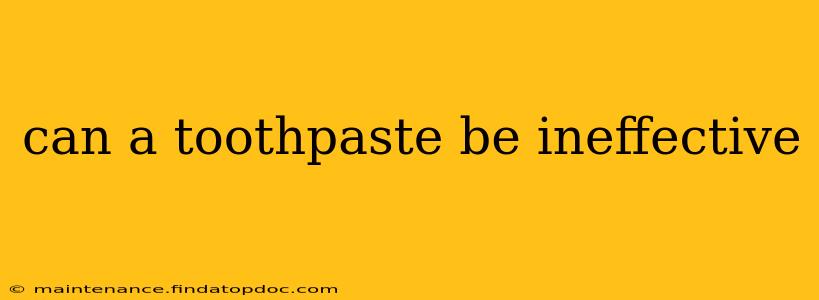Can a Toothpaste Be Ineffective? A Comprehensive Look at Toothpaste Efficacy
Yes, a toothpaste can absolutely be ineffective, and for several reasons. While most toothpastes on the market offer some level of protection, their effectiveness varies significantly depending on formulation, usage, and individual factors. Understanding these nuances is key to choosing and using a toothpaste that truly benefits your oral health.
What Makes a Toothpaste Ineffective?
Several factors can contribute to a toothpaste's ineffectiveness:
-
Insufficient Fluoride: Fluoride is the cornerstone of cavity prevention. Toothpastes with inadequate fluoride concentration won't provide optimal protection against tooth decay. Look for toothpastes with at least 1,350 parts per million (ppm) of fluoride, especially if you're prone to cavities.
-
Poor Formulation: Some toothpastes might boast impressive marketing claims but lack the scientific backing to support them. Check the ingredient list carefully. The absence of essential ingredients like fluoride or the presence of ineffective abrasive agents can hinder its efficacy.
-
Incorrect Usage: Even the best toothpaste won't work if used improperly. Failing to brush for the recommended two minutes, twice daily, with proper technique, significantly diminishes its effectiveness. Similarly, neglecting to floss removes plaque and food particles from areas a toothbrush can't reach, rendering even the most effective toothpaste incomplete.
-
Underlying Health Conditions: Certain medical conditions or medications can affect oral health, rendering even a highly effective toothpaste less successful in achieving optimal results. Dry mouth, for example, reduces saliva production, hindering the natural cleansing process and increasing cavity risk.
-
Specific Needs Not Met: Some toothpastes are designed to target specific oral health concerns, such as sensitivity or gum disease. Using a general-purpose toothpaste when you need a specialized one might prove ineffective. For example, a desensitizing toothpaste is needed for people with sensitive teeth, not a whitening toothpaste.
How Can I Tell if My Toothpaste is Ineffective?
Several indicators might suggest your toothpaste isn't working optimally:
- Persistent Cavities: Despite regular brushing and flossing, you continue to develop cavities.
- Increased Gum Inflammation: Your gums remain persistently red, swollen, or bleed easily even with diligent brushing.
- Persistent Bad Breath: You experience persistent bad breath despite regular brushing and flossing.
- Sensitivity to Hot or Cold: You experience persistent or increasing sensitivity to hot or cold temperatures.
What Should I Look for in an Effective Toothpaste?
To ensure you're using an effective toothpaste, consider these factors:
- ADA Seal of Acceptance: Look for the American Dental Association (ADA) Seal of Acceptance. This indicates that the toothpaste has met the ADA's standards for safety and effectiveness.
- Fluoride Content: Check the fluoride concentration. Higher concentrations (within safe limits) generally offer greater protection against cavities.
- Ingredient List: Examine the ingredients. Avoid toothpastes with excessive amounts of abrasive agents, as these can damage tooth enamel over time.
Does Whitening Toothpaste Affect Effectiveness?
Whitening toothpastes are generally safe and effective for removing surface stains, but they might not be as effective at preventing cavities or gingivitis if they have a lower concentration of fluoride or lack other beneficial ingredients. The abrasive nature of some whitening toothpastes can also contribute to enamel erosion if overused.
Is it Necessary to Use a Specific Toothpaste for Sensitive Teeth?
Yes, using a toothpaste specifically formulated for sensitive teeth can be beneficial. These toothpastes often contain ingredients that help block the transmission of pain signals to the nerves in your teeth, providing relief from sensitivity.
By carefully considering these factors, you can select and use a toothpaste that effectively supports your oral health goals. Regular checkups with your dentist remain crucial for early detection and prevention of oral health issues.
